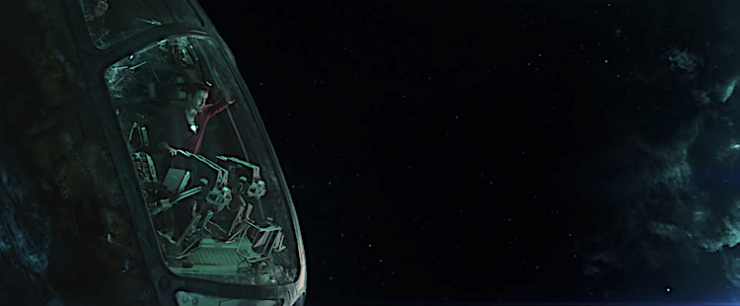We were having an early dinner before watching Avengers: Endgame, and someone suggested placing bets on predictions for the film. (Just for points—we’re all broke.) My one and only prediction was that they were going to steal Titanic’s ending and that the final scene would be a door opening into a 1940s USO hall with Peggy in her WWII dress uniform, waiting to finally have her dance with Cap. “Steve goes to Heaven, everyone else lives.”
I wasn’t exactly right, but my joke landed closer than I expected?
[Spoilers ahead.]
Last week I wrote about the ways Marvel dabbled in a particular type of secularized Rapture narrative. I wondered if Endgame would dwell on a post-Snapture world, creating a sort of superheroic Leftovers. As it turned out, the film did spend some time exploring how the world would cope with a catastrophe that large… but then it veers in a fascinating direction by using its time travel plot to create glimpses of a pseudo-afterlife for some of its characters in the form of personalized, secular Heavens.
I’ll get into it in a slightly more depth in a moment, but when I say “secular Heaven” I mean that characters are given an opportunity to reconcile or reunite with dead loved ones—the kind of opportunity that a character usually gets in a gauzy afterlife-type of setting. (Or occasionally at King’s Cross Station.) Given that the MCU has revolved around issues of death since the first Iron Man, this maybe isn’t that surprising, but I was still startled by who got chances at closure and who didn’t. And while we expected the characters who were Snaptured to be returned to us (it’s hard to mourn Peter Parker when you know Far From Home is hitting theaters in July), Endgame makes an interesting choice in revisiting characters who suffered non-Snap deaths, long before Infinity War and Endgame. And in addition, they gave us two different joyful resurrections, and one that’s straight out of a horror movie—but I’ll also get to those in a second.
Garden Variety Resurrections, Plus One Zombie?
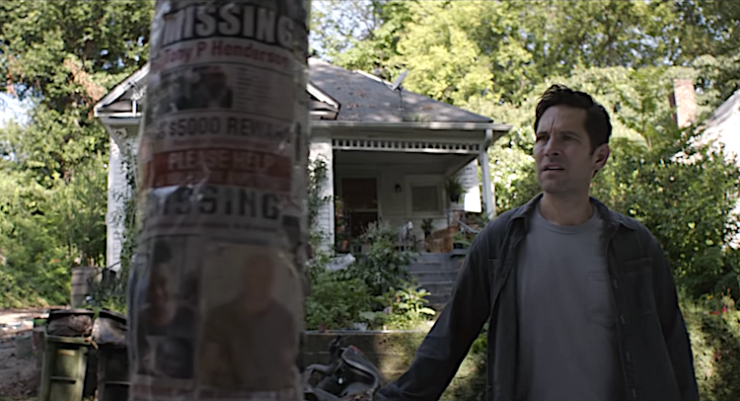
The MCU’s big ending gambit revolves around death. Not just with a villain named Thanos, but also in showing half of the population snapped out of existence in the final moments of Infinity War. I remember how weird the mood in the theater was—somber, mournful. Even those of us who knew that the characters would come back somehow were deeply unsettled by watching everyone disappear. The last shots of the film show stalwart Captain America collapsing on the ground and helplessly muttering “Oh, God,” as he realizes they’ve failed… and then we cut to Thanos smiling in his empty Eden.
The opening of Endgame follows on this tone, first with the eerie sight of four-fifths of the Bartons disappearing, followed by the elegiac, grey-lit scenes of support groups and empty neighborhoods in the post-Snap world. The film grounds us in death and loss. But here’s an interesting thing: it also gives us multiple resurrections.
The first resurrection is that of Tony Stark. The day that his ship is finally going to run out of oxygen, Tony records a final message for Pepper (hoping that she’s still alive, since he obviously can’t know) and then lets himself go to sleep. He’s awakened by Captain Marvel’s incandescent glowing self. When Nebula carries him down the ramp, He’s being returned to Steve and Rhodey, but he’s also learning that Pepper survived the Snap. After nearly a month, they have someone returned from apparent death.
Meanwhile, Cassie Lang gets her dad back five years after his disappearance. She assumed he’d been Snapped, had his name added to San Francisco’s Memorial Wall, and then he turns up at her door. For him it’s only been a few hours of being stuck and confused in the Quantum Realm, plus obviously the gut-churning panic of a day spent trying to find her once he found out the Snap had, uh, Snappened. From her point of view, though, he was gone for five years. She has mourned him and moved on into her tweens, and now suddenly he’s returned to her, looking exactly as he did when he left. (Although, this is Paul Rudd we’re talking about, so there wouldn’t be any noticeable aging anyway.)
The film doesn’t give much time to these reunions. They expect us to do the work and fill in the emotional conversations between Tony and Pepper, and what must have been a bumpy couple of days of catching up for Scott. Of course then Scott immediately drives cross-country to meet up with the Avengers. The film also skirts the issue of U.S. infrastructure—how are the highways doing? How are gas prices? How did Scott manage this trip in a van that’s been sitting in a storage lot for five years? How exactly did he walk out on his shocked and overjoyed daughter, to drive from San Francisco to New York, seemingly only a couple days after coming back from the dead??? This is all the more upsetting since the movie never tells us if Cassie’s mom or stepdad survived the Snap. But that still isn’t the most upsetting resurrection of the movie.
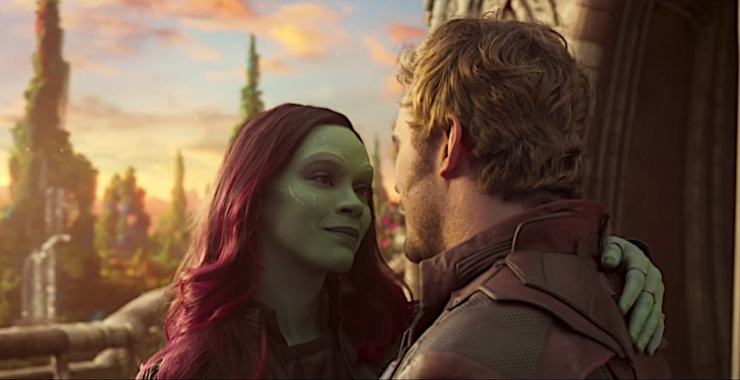
Pepper and Rhodey ran to embrace Tony as he staggered down the ship’s ramp, and Cassie Lang burst through her front door to hug her long-lost father. I’m not such a stonehearted human that I’ll deny tearing up on both of those occasions. But I was also shocked by the movie’s unexpected riff on a zombie/vampire narrative, when Gamora comes back… different. This is not the Gamora who chose of her own free will to go against Thanos’ plan. Not the woman who risked her life to stop Ronan and get the power stone, the one who created a new family with the Guardians, repair her relationship with Nebula, and maybe, kinda, sorta, started a relationship with Quill. We don’t get the Gamora who’s learned how to sing—and neither does Quill.
No, this is the angry, murderous Gamora, vicious and savage and still complicatedly tied to Thanos, who is just taking her future-sister’s word for it that the two have a real bond. This isn’t even a reset, this is a Gamora we don’t truly know. Quill runs into the arms of a woman he thought he’d lost forever, and she kicks him in the crotch and punches him. This is played for laughs in the film, but to see it from Quill’s perspective, one of his last conscious memories is losing his beloved, only to then die himself. Now he’s back, and his girlfriend is standing over him looking at him with utter disgust while her sister mocks him.
In what way is this not a nightmare scenario?
Unlike the prior resurrections this one is a cold hard reboot, and the movie never really addresses the emotions swirling around it.
Oo-ooh Heaven is a place…in the past?
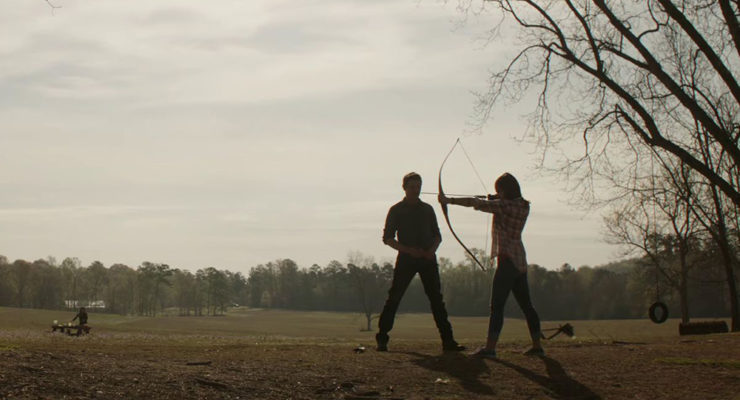
But those are just garden variety returns from the dead. Where the film got more interesting was in how they created secular versions of Heaven.
What is the point of Heaven? Most religions that have a concept of Heaven build it around an idea of worship. For the truly religious, Heaven is an opportunity to spend eternity expressing praise for the Creator figure, or possibly in a sort of ego-less oneness with the flow of creation. But as long as there’s been that concept of afterlife there’s been the parallel idea that it would be an opportunity for reckoning or reconciliation with the dead. Even the great literary architect of afterlife, Dante, only got around to the praising God and Mary part AFTER he spent a whole bunch of Cantos shitposting about where people ended up in Hell and Purgatory. A modern idea of Heaven seems to spring more from this “Five People You Meet in Heaven”-type thread. The MCU, which has spent a shocking amount of its runtime revolving around a meditation on death, now gives us an era-defining blockbuster that meditates on this modern version of Heaven.
We see a hint of it in Clint’s arc. The film, wisely, opens on the loss of his family, giving us the other side of the Snapture. Where in Infinity War we were with characters who knew what was happening and why, now we’re with non-superpowered Clint Barton, on house arrest no less, who can do nothing to save his loved ones. Once he’s rescued from his (dumb, imho) Ronin subplot, he volunteers to test Stark’s time travel bracelent because he’s the one who has lost the most. He’s transported to his farm and hears his kids’ voices for the first time in five years, immediately drops any notion of the plan, and runs to them. Because of course he does—how could you not? Luckily he gets yanked back to the future before they see him. Then, during the brief moment when Bruce’s Snap has worked and we think everything’s worked out, Clint learns that his family is back because Laura is calling him on the phone. But of course, just as he’s picking up, Thanos blasts Avengers HQ into oblivion. Twice Clint gets not a Heaven, but one of those terrible mourning dreams when you know the person you lost is in the next room, or you can hear their voice, and then you wake up into the knowledge that they’re gone.
It isn’t until after the battle, and after Tony’s snap, that he finally gets to return to them in an appropriately misty scene at their farm upstate.
Which brings us to the three “Heavens” of the film.
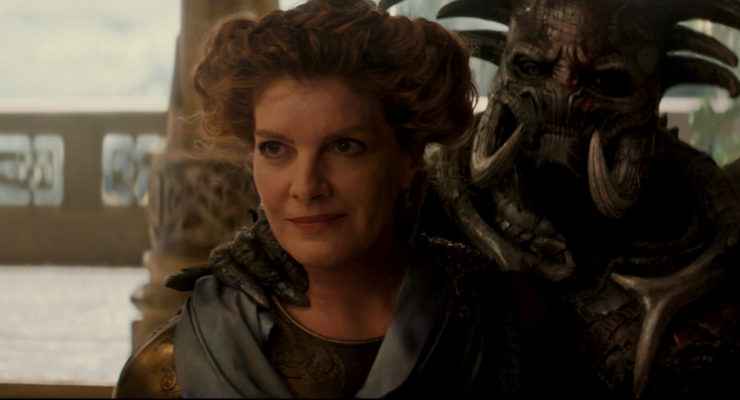
When Thor and Rocket go to Asgard to grab the ether from Jane, Thor’s reaction is to panic and go look for the ale stores. But instead of either charming Jane or comically running into his past self, he instead has a heart-to-heart with his mother, who died tragically in The Dark World seven years ago—on the very day he’s revisited. He gets a chance to hear her voice and absorb her wisdom again, knowing this time how precious this opportunity is. In the midst of a high stakes heist and time travel shenanigans, he gets to hear his mom say she loves him. The movie takes the time to give him that.
This leitmotif is carried forward even more strongly in Tony’s meeting with Howard Stark, where the two have an emotional conversation about fatherhood and fear. Logistically this simply does not work, because Howard Stark, tech genius and co-founder of S.H.I.E.L.D., would never open up to a total stranger in this way (If he was capable of that, he’d probably be a better dad, no?) and he especially wouldn’t be so chatty with the “guest from MIT” that he just found lurking suspiciously in a secret lab underneath New Jersey. And then Tony hugs him??? Grown adult men who lived through WWII did not hug. It’s part of why we have toxic masculinity.
But that isn’t the point of this scene, of course.
Tony’s arc throughout the MCU has hovered between two poles: his unresolved feelings about Howard Stark, and his fear of, and obsession with, his own death. The first Iron Man takes a midlife mortality crisis and makes it epic—where most moguls simply have a life-changing heart attack, Tony is blown up by his own weapons, taken hostage by terrorists, hooked up to a car battery to magnetize the shrapnel in his chest, implanted with an arc-reactor, and repeatedly told he must not waste his life by his dying savior/lab assistant/friend. Instead of a sports car (he already has several of those) he spemds money on a flying suit. Instead of simply trying to change the direction of his warmongering company, he has to personally fly to the Middle East to save people from Stark Industries weapons, before murdering his replacement father and saving the world. Along the way he tells Pepper that he shouldn’t have survived “unless it’s for a reason,” and it’s that moment of raw vulnerability that convinces her to work with him as Iron Man in addition to working with him as Tony Stark.
In his second solo film, he learns that the thing that’s keeping him alive is also poisoning his blood, leading him to up the midlife-crisis-ante with a highly inadvisable car racing stunt, and an even more highly inadvisable drunken birthday party/brawl, before a clue from his dead dad helps him invent a new element to keep himself alive. Then he almost dies again saving the world from the Chitauri in The Avengers, but only after telling Bruce Banner that he must have survived his gamma radiation blast “for a reason.” Iron Man 3 is all about the PTSD Tony has from his latest near-death experience, his commitment issues (Pepper), his fatherhood issues (Harley), and an ongoing meditation on whether humans have souls—which is kind of? Sort of? proved in a deleted scene. His arc in Age of Ultron revolves around his vision of the horror of a post-Thanos universe, and his arc in Civil War dredges up all the old daddy issues when he has to confront the truth about his father’s death.
Really, for a series of fun blockbusters starring improbably good-looking people, it’s weird how much these movies are about death and loss.
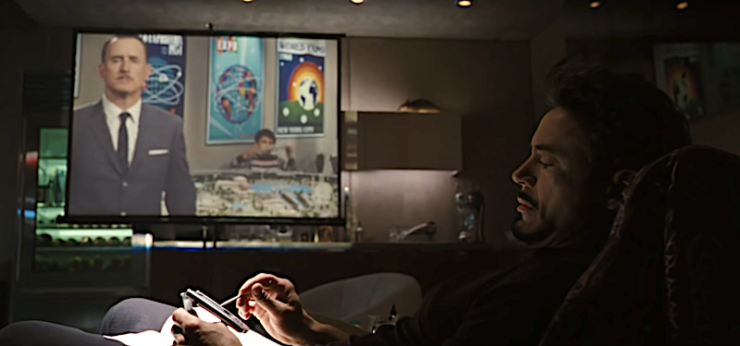
The point of Tony Stark meeting Howard in the past is that Iron Man, already dead twice over in the MCU, already at death’s door a third time before Captain Marvel saves him, has to get a few moments of delicious onscreen Heaven before he makes his big sacrifice play at the end. He gets to talk to his father, man-to-man, in a way he never did while Howard was with him on Earth. He gets to impart some fatherly expertise to the impossibly accomplished icon who never treated him like an adult. And then at the end he gets that hug that he’s wanted since the opening scene of Iron Man. When he gets back to the future it becomes obvious that they’re not all making it through this. They lose Widow (introduced all the way back in Iron Man 2, don’t forget) and things repeatedly look hopeless before they turn the tide of the battle. And even then it has to fall to Tony to end things by embracing the death that he’s dodged since 2008. But first he leaves a message for his daughter, who will grow up knowing he loved her. He hugs Peter, who will know how proud he is. Tony has undone all of the damage his father did, and then some—he has become a better man than Howard Stark, but he has also been given the chance to reconcile with his father.
Having given us several different time travel-based pseudo Heavens, it now goes about getting rid of the self-made God who’s caused all these problems. Thanos cast himself as the only right-thinking being in the universe. He was the only one who could see that life needed to be halved, and his implacable reasonableness was immune to all of the screams and pain of his victims. One of my favorite things about Endgame was that they recast this twice. We see him in his Garden having snapped the Stones themselves out of existence. He is alone, in pain, in a horrifying twist on an Edenic Paradise—but he still doesn’t express any regret for his actions, just a very, very slight warmth toward the Esau to Gamora’s Jacob, Nebula. Then Thor decapitates him, and they are all cast from the Garden back into a hopeless post-Snap universe. At the end of the film the Past Thanos crashes into the future, still arrogant and convinced of his own righteousness. Except now, faced with Earthly unruliness, he lets all of his masks slip. He doesn’t just want the Snap to create balance, he wants instead to destroy all of life, so that he might recreate the universe in his own image, with no memory of the pain he’s caused, so he might be worshiped as the God he’s always wanted to be.
Which of course is the point where Tony, man of science, unruly human resident of Earth, uses the mystical Infinity Stones in concert with his own brilliant tech to Snap Thanos out of existence. Human imagination and curiosity, in concert with scientific training, defeats an arrogant mad god.
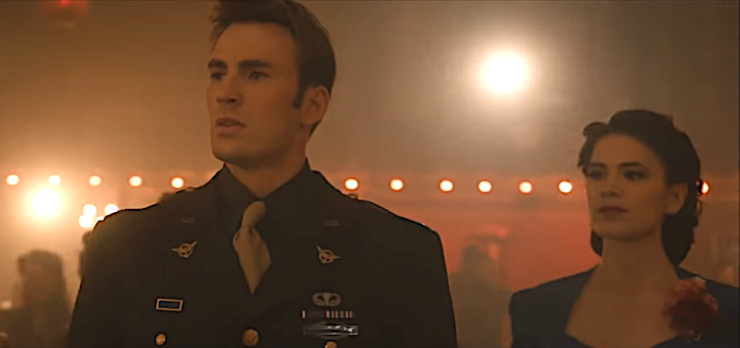
But the film still has one more secular Heaven to give us. When Cap left to take the Infinity Stones back in time, I think we all knew what was gonna happen. Obviously when he misses his return trip it’s because he’s going to show up old, having lived out the life he sacrificed in First Avenger, and obviously he has to stop by to give Sam his Shield so that Falcon and Bucky can go off to their Disney+ spin-off. It’s a lovely scene, and for a moment I thought I wasn’t going to get my ending. But ohhh no. There’s a wedding ring. And then in the last scene, the truly last scene, we go back in time, and the camera literally sails into Steve and Peggy’s house as they slow-dance to the Harry James Orchestra recording of “It’s Been a Long, Long Time.” It isn’t exactly a slow dance in the ballroom of the Titanic, but it’s damn close.
We watch as Steve gets his Heaven—and the love of his life (non-Bucky edition) finally gets that dance. And we’ve already seen Peggy’s funeral, so now we get to go back in time to young Agent Carter. Both of them get the thing they’ve wanted most, and they get it during their lives, onscreen. (Obviously this opens a giant can of time travel related worms [and don’t even get me started on #Stucky] but that’s not what this post is for.) Steve also gets to come back, hand his shield off, and anoint Sam as the next Cap, before presumably returning home to Peggy, or to his life as a-widower-who-still-wears-his-ring (SOB) and shuffling his mortal coil off at some point in the future. However it shakes out, the Russos make a point of ending the film on that dance in the 1940s, since that’s the moment that stands outside of time as Cap’s happiest moment. This is his Heaven.
Heaven is a Place Where Nothing Ever Happens
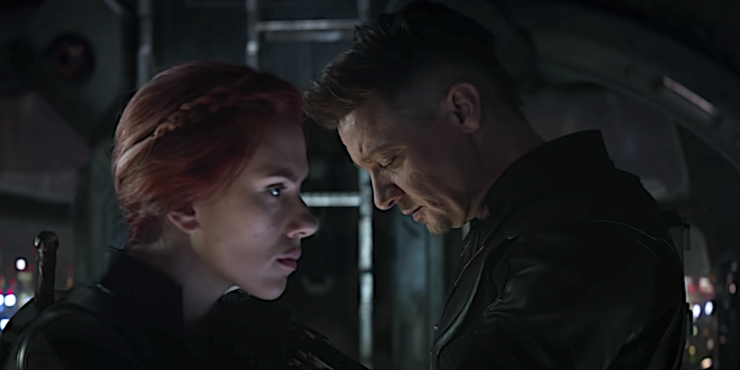
On the one hand it makes sense that a series that spent so much of its time circling its characters’ mortality would want to cheat a little bit, and give us an emotional reconciliation of our own—this isn’t Game of Thrones, after all. Marvel wants us to be happy. But it also leads me to ask some uncomfortable questions: what about Nat, or Vision, or Wanda? Why do some people’s closures outweigh others? Toward the end, Clint is talking to Wanda and says that he wishes he could tell Natasha her sacrifice worked. Wanda replies by saying “She knows. They both know.” And then Clint hugs her. Now the emotional read on this is that Wanda means Vision—he’s one of the only ones who didn’t come back in any fashion, so now over the course of her time with the MCU she’s lost not only her parents and her twin, but also her lover. But of course she could mean Gamora, who might be with Nat in the Soul Stone? Or she could also mean Tony, the only other person who sacrificed everything in this battle. (Especially since Vision isn’t technically even a human, and what exactly is the threshold for having a soul in the Marvel universe?)
But this doesn’t really do the same work as watching Tony talk with Howard, or Thor talk with Frigga. Obviously Tony hasn’t changed Howard in any substantial way—his childhood is still going to suck. Frigga is still going to die. So why were these moments given precious screen time? Are they there to ease our minds, to give us a sense that our heroes got some sort of happiness in the midst of all the Thanos-related pain? But then what was Natasha’s Heaven? What was Vision’s?
Leah Schnelbach wants the Asgard Heaven! Come frolic with her on the farm upstate that is Twitter!










